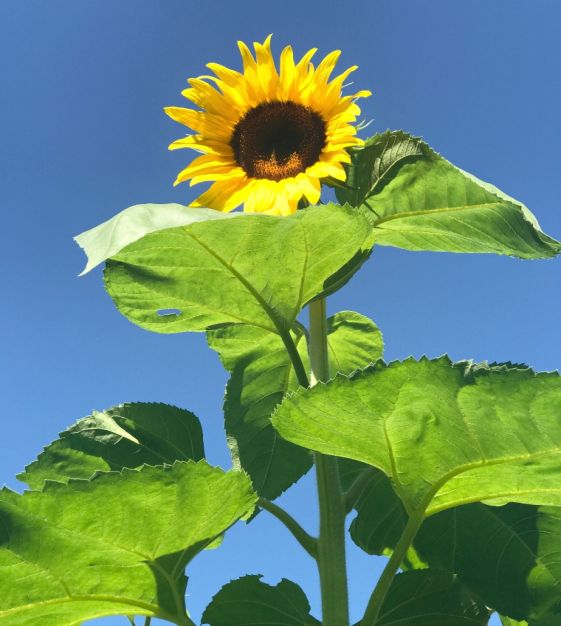Can you grow the tallest sunflower in Will County this year?

Sunflowers to me are the epitome of summer and the Midwest. They are like our people here: grow well in tough conditions, versatile, help nature, man and their fellow sunflower, and they are always looking up.
It seems over the last few years, sunflowers are everywhere. Even though this column I write is on my own (not affiliated with my work), today’s column is featuring a work project Will County Master Gardener “Can You Grow the Tallest Sunflower in Will County Contest.”
First a little disclaimer: We did this program during the dreaded COVID shutdown as a fun way to do something that was a non-contact program at home. At the end of the summer, we were going to have a celebration and awards for tallest sunflower in many categories. Unfortunately, COVID rebounded, and we were back to restrictions, so we couldn’t have that celebratory end. But we will this time!
The contest is simple — Anyone can register. You can do a single registration per person of any age, or a group for a 4H club, church group, garden club or group of friends. For the contest to work, everyone needs to grow the exact same type of sunflower. In our contest, it is the American Giant variety of sunflower.
These American Giants have a particularly important characteristic for height contests; they are bred with a particularly strong neck that holds their flower straight and high. If you have ever grown the giant sunflowers, you know the weight of the seed head often causes the stem to bend way over in a hunched position, even sometimes to the point of breaking.
I also wanted to avoid any of the pollenless varieties. Just the word pollenless hurts my insect- and food-loving heart. Pollen is what allows plants to make viable seeds via the pollinators. Why on earth would anyone want pollenless? This is more about fashion than it is about allergies.
The florists and wedding trade like pollenless varieties because the yellow dust of pollen stains; pollenless varieties avoid the bright yellow stains on wedding gowns, white shirts, and tablecloths. And yes, for those with pollen allergies, pollenless flowers might be preferred. It is a personal choice, of course, and from a practical perspective, I guess I would still want someone to use real flowers instead of silk, just to avoid the pollen issue.
In case you are curious, pollenless sunflowers were created by plant hybridizers to be male sterile and therefore pollen-free. That is not to say pollenless flowers don’t still offer something to nature; they do — nectar. American Giant produces pollen and nectar, so you can expect to see a wide variety of pollinators from different kinds of bees, butterflies, and many other insects.
The contest doesn’t open until May 10. Here is the registration link: https://go.illinois.edu/sunflowercontest Individual participation $3.00, Group participation $5.00. Each registrant will receive 10 seeds with instructions for planting and care. Additionally, age-appropriate children’s learning sheets about sunflowers will be included for children who register. And everyone will receive information on the history, folklore, and sunflowers as an agricultural product, along with a few sunflower recipes.
When your sunflowers have opened fully is when you will measure them and submit your height numbers. There will be several categories based on age, single and group. We will have a Sunflower Spectacular Celebration for all participants in mid-August and will announce the winners then. Winners will receive small prizes.
Sunflowers are one of the easiest plants to grow. They tolerate, and actually enjoy, poor conditions. They don’t need extra special soil preparation. It is better to direct-sow sunflowers than to try to give them a head start inside. What could be easier?
Their main requirements are — you guessed it — sun. The other, avoid soggy soil sites. Sunflowers are quite drought-tolerant and don’t do well where it is boggy and wet. It is good to water them until they germinate and start growing. Also be sure to keep the area weed-free to avoid competition by other plants. After that, sunflowers really do their own thing.
In the activity sheets, there will be insect and animal identification about the visitors who may come to your sunflowers. You will be amazed at how quickly they grow and how tall they will get. In our first contest, someone reported a sunflower of 15 feet!
I also want to thank Mark Schneidewind and the Will County Farm Bureau for helping to sponsor this program. If you have any questions, feel free to contact me at [email protected] or call the Will County Extension Office at 815 727 9296.
This is a simple, easy great learning activity for everyone. I hope you join us.